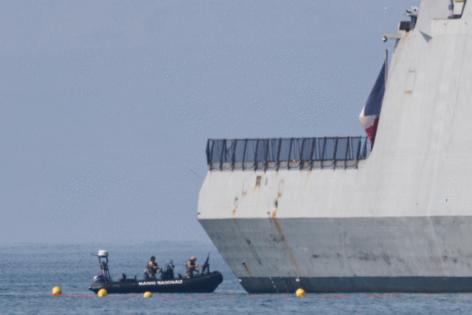'Don't bring the war here': How tiny Djibouti navigated Red Sea crisis
Published in News & Features
Capt. Mohammed Houssein Omar patrols one of the most dangerous coastlines in the world. Until the Israel-Hamas conflict reignited seven months ago, it was largely people smugglers and drug traffickers that occupied his fleet of nearly 70 coast guard patrol boats. But since Houthi militants from neighboring Yemen began attacking commercial ships in the Red Sea, the coast guard officer has never been so stretched.
“Nobody deserves to be attacked with missiles,” he says. “Those targeted in the Red Sea are innocent, so we are there to help.”
Djibouti, an authoritarian former French colony of just 1 million people, only gained independence in 1977 and is surrounded by bigger, more unstable neighbors. It is bordered to the north by Eritrea, a pariah state for the best part of two decades; to the south by Somalia, which has been ravaged for years by an Islamist insurgency; and to its west by Ethiopia, recovering from a brutal civil war that killed more than 500,000 people in just two years, according to U.S. and European Union estimates.
The location of the tiny East African nation, at the point where the Red Sea meets the Gulf of Aden, has made Djibouti — a predominantly Islamic country — a strategic priority for major powers. It’s home to Chinese, French, Italian, Japanese and U.S. military bases. Germany would like its own naval base in the country too, according to diplomats in the region. Tokyo has recently supplied new coast guard patrol vessels.
In parallel, it has developed a reputation as an intelligence hub, say Western diplomats. Imagine a Cold War Berlin on the Horn of Africa, but this time acting as an intersection between the West and the Arab world. The up-market Djibouti Palace Kempinski Hotel is popular with the tight-knit intelligence community.
“There’s an old saying: ‘Where goods flow, information flows.’ This place is a harbor,” one diplomat says. “Intelligence officers need hubs.”
These international investments in military hardware and intelligence gathering have never looked more important. The Iran-backed Houthi militants, who say they are targeting Israeli-linked cargo ships, have caused the most significant diversion of seaborne trade in decades. In the first two months of 2024, trade through the Suez Canal, which sits at the top of the Red Sea, dropped by 50% from a year earlier, according to the International Monetary Fund.
Djibouti — an area the size of Massachusetts — has successfully positioned itself over the last two decades as an indispensable asset in the region. That gives it some leverage, but it will need to walk a diplomatic tightrope to retain its neutrality which has been under pressure since the Red Sea crisis erupted.
Critical of Israel’s military action in Gaza, which has left more than 35,000 people dead, according to the Hamas-run health ministry in the territory, Djibouti has nevertheless quietly allowed naval vessels from the EU’s Aspides mission — with orders to protect cargo ships in the Red Sea — to refuel and use its port facilities. Several vessels damaged by Houthi missiles have been repaired by local workers in Djibouti.
As a direct consequence of the Houthis’ violent campaign, Djibouti's container port is undergoing an economic boon. More ships now dock to unload goods onto smaller vessels — part of the country’s growing transshipment business — to take them through the perilous Red Sea. On a recent visit, dozens of engineers and crane operators were hastily loading containers onto vessels, as four recently purchased, state-of-the-art German cranes hovered overhead.
...continued
©2024 Bloomberg L.P. Visit bloomberg.com. Distributed by Tribune Content Agency, LLC.







Comments